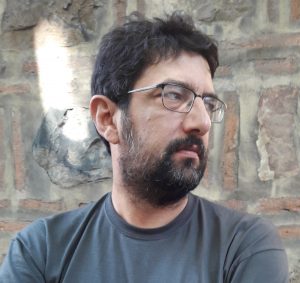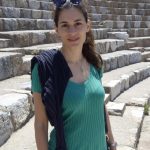Scientific Coordinators

Elias Kolovos is Assοciate Professor in Ottoman History at the Department of History and Archaeology, Faculty of Philosophy, University of Crete, Greece, and director of the M.A. in Ottoman History Programme of the same Department. As a visiting scholar, he taught at the Ecole Pratique des Hautes Etudes, Paris, and Boğaziçi University, Istanbul. He was also a visiting fellow of the Center for Hellenic Studies, Princeton University. He participates in a research project at the Max Planck Institute for the Science of Human History, and at the “Islamic Legacy” Action of the European Cooperation for Science and Technology. He is an elected member of the Board of the International Association for Ottoman Social and Economic History. He has written, edited, and coedited 13 books and over 60 papers in Greek and international publications and journals. His research interests include the Mediterranean economic history, the history of the insular worlds, the history of the frontiers, rural and environmental history, as well as the spatial history and legacies of the Ottoman Empire.

Panagiotis C. Poulos (BA, PhD SOAS, University of London) is Assistant Professor of Ethnomusicology at the Department of Music Studies at the National and Kapodistrian University of Athens and member of the Ethnomusicology and Cultural Anthropology Laboratory of the same department. His research centers on the musical traditions of the Middle East, the cultural history of late Ottoman and Turkish music and arts with a focus on the role and status of non-Muslim communities, the intercommunal relations and the history of everyday life in Ottoman cities. Panagiotis C. Poulos is one of the founding members of the research team sonorCities and Principal Investigator of the research project Intercommunal Musical Geographies of Late Ottoman Istanbul (Hellenic Foundation for Research and Innovation 2019-2022). He is co-editor of Ottoman Intimacies, Balkan Musical Realities (2013, Finnish Institute at Athens) and author of Music in the Islamic World: Sources, Perspectives, Practices (e-book, 2015, Hellenic Academic Libraries Link). In 2013 he was awarded an honorable mention Ömer Lütfi Barkan Award by the Ottoman and Turkish Studies Association for his article Rethinking Orality in Turkish Classical Music: A Genealogy of Contemporary Musical Assemblages (MEJC 4, 2011).
Assistant Coordinator
Samia Samara is a research associate at the Institut des Sciences Sociales du Politique – Université Paris Nanterre. After graduating from the École des Beaux-Arts in Tunis, Samia Samara studied spatial and urban planning at the University Paris Ouest Nanterre where she completed a PhD in 2016. Her thesis focused on the evolution of protection and preservation policies of historical monuments and archaeological sites in contemporary Greece (1830-2013), having the city of Athens as case study. Since a research residency at the Centre Jacques Berque in Rabat (IFRE-CNRS) in 2015, her works focus on the monumental heritage said of “domination” or “minorities” in some Mediterranean countries (Greece, Tunisia, and Morocco). “Heritagization” processes in these societies, where the recent past can still be “refuted”, is her main research’s object.
Education Unit
 Eleni Kallimopoulou is Assistant Professor in Ethnomusicology at the University of Macedonia. She studied ethnomusicology with an emphasis on the musical cultures of the Near and Middle East (PhD, SOAS, University of London). She is author of the book Paradosiaká: Music, Meaning and Identity in Modern Greece (Ashgate), co-author of Learning Culture through City Soundscapes – A Teacher Handbook (University of Macedonia), and co-editor of Introduction in Ethnomusicology (Asini). Her research interests centre on Greece and the Mediterranean; musical performance and ethnography; public folklore and the politics of culture; nationalism, religion and ritual; oral history; and auditory culture and urban space. She is a founding member of SonorCities, a research study group on the history and ethnography of sound and the senses. She is presently a member of the board of directors of the Greek Oral History Association and the Folklore and Ethnological Museum of Macedonia and Thrace, and of the International Advisory Board of Ethnomusicology Forum.
Eleni Kallimopoulou is Assistant Professor in Ethnomusicology at the University of Macedonia. She studied ethnomusicology with an emphasis on the musical cultures of the Near and Middle East (PhD, SOAS, University of London). She is author of the book Paradosiaká: Music, Meaning and Identity in Modern Greece (Ashgate), co-author of Learning Culture through City Soundscapes – A Teacher Handbook (University of Macedonia), and co-editor of Introduction in Ethnomusicology (Asini). Her research interests centre on Greece and the Mediterranean; musical performance and ethnography; public folklore and the politics of culture; nationalism, religion and ritual; oral history; and auditory culture and urban space. She is a founding member of SonorCities, a research study group on the history and ethnography of sound and the senses. She is presently a member of the board of directors of the Greek Oral History Association and the Folklore and Ethnological Museum of Macedonia and Thrace, and of the International Advisory Board of Ethnomusicology Forum.
 Kostis Kornetis received his PhD in History and Civilization from the European University Institute, Florence. He taught at the History Department at Brown University and at the Center for European and Mediterranean Studies at New York University. Since 2015 he works as CONEX-Marie Curie experienced researcher at the History Department of Carlos III, Madrid. His book Children of the Dictatorship. Student Resistance, Cultural Politics and the “long 1960s” in Greece (Οξφόρδη/Νέα Υόρκη, 2013) was awarded the Edmund Keeley Prize. He has coedited Consumption and Gender in Southern Europe since the “long 1960s” (London, 2016) and Metapolitefsi. Greece in-between two centuries (Αθήνα, 2015). His research focuses on the history of social movements, the methodology of oral history, the use of film as a source for social and cultural history and sensory history.
Kostis Kornetis received his PhD in History and Civilization from the European University Institute, Florence. He taught at the History Department at Brown University and at the Center for European and Mediterranean Studies at New York University. Since 2015 he works as CONEX-Marie Curie experienced researcher at the History Department of Carlos III, Madrid. His book Children of the Dictatorship. Student Resistance, Cultural Politics and the “long 1960s” in Greece (Οξφόρδη/Νέα Υόρκη, 2013) was awarded the Edmund Keeley Prize. He has coedited Consumption and Gender in Southern Europe since the “long 1960s” (London, 2016) and Metapolitefsi. Greece in-between two centuries (Αθήνα, 2015). His research focuses on the history of social movements, the methodology of oral history, the use of film as a source for social and cultural history and sensory history.
Digital Humanities Unit

Anna-Maria Sichani is currently a Marie Skłodowska-Curie Fellow (DiXiT ITN) at Huygens-KNAW and a Research Fellow at King’s Digital Lab. She holds a BA and an MPhil in Modern Greek Philology (University of Athens) and a MA in Digital Humanities (UCL) and she is currently completing her PhD in Modern Greek Philology at University of Ioannina (Greece). Anna-Maria’s research interests, work experience and expertise intersect the changing materialities of literary culture, textual scholarship and scholarly communication with a particular focus on their related practices, politics and economics, as well as research infrastructures and digital pedagogy. She has collaborated with a number of Digital Humanities projects and institutions (Transcribe Bentham, DARIAH GR- DYAS, etc) and her skills include modelling, encoding and digital publication of textual materials, data architecture and analysis.
 Dimitris C. Papadopoulos is Instructor of Anthropology at Western Michigan University. He previously taught at Lehman College, City University of New York, and was recently (2015-2016) a Postdoctoral Research Associate at the Institute for Religion, Culture and Public Life at Columbia University. His research centers on the question of socio-cultural space. Using perspectives from the anthropology of place and landscape, material culture studies, new media and digital humanities he works on borders, borderlands and liminal spaces of transition, displacement, coexistence and contestation in Greece, the Balkans, and the Mediterranean. He is also interested in the practices and technologies of mapping and visualizing physical, historic and information environments. His work has appeared in various journals and as book chapters in collected volumes.
Dimitris C. Papadopoulos is Instructor of Anthropology at Western Michigan University. He previously taught at Lehman College, City University of New York, and was recently (2015-2016) a Postdoctoral Research Associate at the Institute for Religion, Culture and Public Life at Columbia University. His research centers on the question of socio-cultural space. Using perspectives from the anthropology of place and landscape, material culture studies, new media and digital humanities he works on borders, borderlands and liminal spaces of transition, displacement, coexistence and contestation in Greece, the Balkans, and the Mediterranean. He is also interested in the practices and technologies of mapping and visualizing physical, historic and information environments. His work has appeared in various journals and as book chapters in collected volumes.
Heritage Management Unit

Evangelos Kyriakidis is a Senior Lecturer in Aegean Prehistory and Leventis Senior Research Scholar in Heritage Management at the University of Kent. He is the founding director of the Heritage Management Organization and the academic director of the Kent-AUEB MA in Heritage Management ranked consistently in the top 10 MAs for Arts and Culture Management Internationally. A fellow of the society of Antiquaries of London, Evangelos was trained in UCL and Cambridge on Archaeology, Linguistics and Anthropology. Prior to Kent he was visiting professor at UCLA. He is interested in Heritage Management as well as Minoan iconography, religion, ritual, scripts and administration.
Aris Anagnostopoulos holds a PhD in Social Anthropology from the University of Kent. He has trained as a historian at the University of Leicester. His post-doctoral work is in the interdisciplinary field of archaeological ethnography. His research interests focus on the politics and poetics of the material aspects of the past in the present; he has also published extensively on the creation of public space in early 20th century Crete. He has conducted ethnographic fieldwork with several archaeological projects, including the Kalaureia Project in Poros, Greece, and Koutroulou Magoula at Neo Monastiri, Fthiotida, Greece. He directed the Archaeological Ethnography Summer School in Gonies, Crete for three successive years up to 2016. He currently works with the Initiative for Heritage Conservation, holds a Honorary Lectureship at the University of Kent, and is teaching at the Heritage Management MA (Kent & AUEB) in Elefsina.
 Dr Aspasia (Sissie) Theodosiou is a social anthropologist, having obtained a PhD from the University of Manchester. Currently she is an Assistant Professor with the Technological Educational institute of Epirus. She is also a Senior Researcher in the DAISSy research group of the Hellenic Open University, where she also holds a teaching fellow position. Her research affiliations include also the University of Manchester and the Helsinki University. She was an MC member of the international research network COST Action ISO 803 «Remaking eastern borders in Europe» (European Cooperation in Science and Technology, 2009-13). She has participated in a number of multinational research and networking projects funded in the context of European and national programmes such as Leonardo da Vinci, Erasmus+, ESPA etc. Her research interests revolve around the politics of place and location, ethnic identities and minorities in Europe, the politics of culture and tradition, multiculturalism, borders and the web. In her more recent ethnographic research she has been concerned with new technologies’ impact on societal issues and with digital ethnography, while she has also worked on intercultural mediation for migrants and the current economic crisis and its impact on social cohesion. She is currently developing a research project on the practice and politics of Greek popular music in Israel.
Dr Aspasia (Sissie) Theodosiou is a social anthropologist, having obtained a PhD from the University of Manchester. Currently she is an Assistant Professor with the Technological Educational institute of Epirus. She is also a Senior Researcher in the DAISSy research group of the Hellenic Open University, where she also holds a teaching fellow position. Her research affiliations include also the University of Manchester and the Helsinki University. She was an MC member of the international research network COST Action ISO 803 «Remaking eastern borders in Europe» (European Cooperation in Science and Technology, 2009-13). She has participated in a number of multinational research and networking projects funded in the context of European and national programmes such as Leonardo da Vinci, Erasmus+, ESPA etc. Her research interests revolve around the politics of place and location, ethnic identities and minorities in Europe, the politics of culture and tradition, multiculturalism, borders and the web. In her more recent ethnographic research she has been concerned with new technologies’ impact on societal issues and with digital ethnography, while she has also worked on intercultural mediation for migrants and the current economic crisis and its impact on social cohesion. She is currently developing a research project on the practice and politics of Greek popular music in Israel.
 Faidon Moudopoulos-Athanasiou graduated from the Department of History and Archaeology at the University of Crete in 2013. He completed his MA in Aegean Archaeology at the University of Sheffield (2014) focussing on the Bronze Age of the montane landscapes of Epirus. In 2016 he obtained an MA in Heritage Management from the University of Kent and the Athens University Business School. For this MA he received a research grant from the Piraeus Group Cultural Foundation and his thesis concerned the design of heritage education programs. In 2017 he won a White Rose College for the Arts and Humanities (WRoCAH – AHRC) competition award for his proposal to study the archaeology of early-modern Zagori (NW Greece) and began at the University of Sheffield his PhD research, which he completed in 2021. Throughout his PhD, he remained a Scholar of the A.G. Leventis Foundation, which also sponsored his research.
Faidon Moudopoulos-Athanasiou graduated from the Department of History and Archaeology at the University of Crete in 2013. He completed his MA in Aegean Archaeology at the University of Sheffield (2014) focussing on the Bronze Age of the montane landscapes of Epirus. In 2016 he obtained an MA in Heritage Management from the University of Kent and the Athens University Business School. For this MA he received a research grant from the Piraeus Group Cultural Foundation and his thesis concerned the design of heritage education programs. In 2017 he won a White Rose College for the Arts and Humanities (WRoCAH – AHRC) competition award for his proposal to study the archaeology of early-modern Zagori (NW Greece) and began at the University of Sheffield his PhD research, which he completed in 2021. Throughout his PhD, he remained a Scholar of the A.G. Leventis Foundation, which also sponsored his research.
Archival research
 Kalliopi Amygdalou is an architectural historian and currently a Marie Skłodowska-Curie Fellow at the Hellenic Foundation for European and Foreign Policy, where she is carrying out post-doctoral research on the politicisation of architectural heritage in south-eastern Europe. Between 2015-2017 she was Lecturer at the Department of Architecture of Izmir Institute of Technology in Turkey. She completed her doctoral studies at the Bartlett School of Architecture (U.C.L.) in 2014 with her thesis titled ‘A Tale of Two Cities in Search of a New Identity: The Politics of Heritage and Modernisation in early 20th-century Izmir and Thessaloniki’. She also holds a M.Sc. in Culture and Society from the London School of Economics (2010) and a Diploma in Architecture from the National Technical University of Athens (2009). Her doctoral studies were funded by the Alexander Onassis Public Benefit Foundation and the Foundation for Education and European Culture.
Kalliopi Amygdalou is an architectural historian and currently a Marie Skłodowska-Curie Fellow at the Hellenic Foundation for European and Foreign Policy, where she is carrying out post-doctoral research on the politicisation of architectural heritage in south-eastern Europe. Between 2015-2017 she was Lecturer at the Department of Architecture of Izmir Institute of Technology in Turkey. She completed her doctoral studies at the Bartlett School of Architecture (U.C.L.) in 2014 with her thesis titled ‘A Tale of Two Cities in Search of a New Identity: The Politics of Heritage and Modernisation in early 20th-century Izmir and Thessaloniki’. She also holds a M.Sc. in Culture and Society from the London School of Economics (2010) and a Diploma in Architecture from the National Technical University of Athens (2009). Her doctoral studies were funded by the Alexander Onassis Public Benefit Foundation and the Foundation for Education and European Culture.
 Leonidas Moiras was born in Athens in 1978. He graduated in 2002 from the Department of History and Ethnology, of the Democritus University of Thrace. He obtained his MA degree in Early Modern Ottoman History from İstanbul University, Department of History. He is a PhD candidate at Democritus University of Trace, Department of History and Ethnology. His PhD dissertation is entitled “Ottoman Perceptions of the Greek Nation and Nationalism 1821-1869”. His fields of interest are history of Ottoman political and intellectual ideas, Balkan Nationalisms and political and social history of the Ottoman Empire (19th Century). He is currently working as researcher in the project Histories, Spaces, Heritages the transition from the Ottoman Empire to the Greek state, in collaboration with the research project “The Greek Revolution of 1821: Digital Archive”, Research Centre for the Humanities.
Leonidas Moiras was born in Athens in 1978. He graduated in 2002 from the Department of History and Ethnology, of the Democritus University of Thrace. He obtained his MA degree in Early Modern Ottoman History from İstanbul University, Department of History. He is a PhD candidate at Democritus University of Trace, Department of History and Ethnology. His PhD dissertation is entitled “Ottoman Perceptions of the Greek Nation and Nationalism 1821-1869”. His fields of interest are history of Ottoman political and intellectual ideas, Balkan Nationalisms and political and social history of the Ottoman Empire (19th Century). He is currently working as researcher in the project Histories, Spaces, Heritages the transition from the Ottoman Empire to the Greek state, in collaboration with the research project “The Greek Revolution of 1821: Digital Archive”, Research Centre for the Humanities.

Evangelia Chaldaeaki is a PhD candidate at the Department of Turkish and Modern Asian Studies of the National and Kapodistrian University of Athens funded by the Hellenic Foundation for Research and Innovation (H.F.R.I.). She acquired her bachelor degree from the same Department and has a master’s degree (MA) in Folklore Studies from the Department of Philology, National and Kapodistrian University of Athens. Her master thesis Ο Κ. Α. Ψάχος και η συμβολή του στην καταγραφή και μελέτη ελληνικών δημοτικών τραγουδιών was published from Edition Orpheus in 2018, and also granted with the Kaftantzoglio Award 2018. She has participated in research and educational programs, made presentations in conferences and has published various papers in scientific journals. She is also concerned about traditional Greek music, while she teaches Greek singing at the Center of Greek Music “Foivos Anogiannakes”.
Student trainees
Student Internship Program, National and Kapodistrian University of Athens / HMO